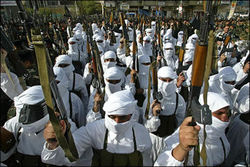 The statement below comes from the Jamestown Foundation web site. It's worth noting who they are. Although the Jamestown Foundation does not explicitly state its foreignpolicy agenda, I have been informed that its forums and publications often align with the neoconservatives' agenda on certain issues such as Taiwan-China, counterterrorism in the Middle East, and
The statement below comes from the Jamestown Foundation web site. It's worth noting who they are. Although the Jamestown Foundation does not explicitly state its foreignpolicy agenda, I have been informed that its forums and publications often align with the neoconservatives' agenda on certain issues such as Taiwan-China, counterterrorism in the Middle East, and - - - -
The militant Islamic threat in the Maghreb (the North-Western region of Africa) which seemed to have been diminishing in recent years, especially in light of the Moroccan crack-down on Islamic extremism in the aftermath of the 2003 Casablanca bombing and the destruction and/or surrender of many of Algeria's main rebel groups between 2000 and 2002, has re-emerged with two disturbing mergers of terrorist organizations. In the Jamestown Foundation's Global Terrorism Analysis, Andrew Black reports in his article, The Reconstituted Al-Qaeda Threat in the Maghreb, that there have been two mergers in this region, "...one among the various Maghrebi groups and the other between the GSPC [the Salafist Group for Call and Combat] and al-Qaeda, the terrorist threat to the region has become an increasingly unified system that provides substantial support to the Iraqi jihad
 and which will increasingly challenge local security services as mujahideen return from Iraq."
and which will increasingly challenge local security services as mujahideen return from Iraq.""On September 11, 2006, as the world's thoughts were on the fifth anniversary of the 9/11 terrorist attacks, al-Qaeda deputy leader Ayman al-Zawahiri issued a statement announcing the merger of his group and the GSPC."
"Demonstrating the significance of this merger to the Algerian jihad, local security services have already remarked that al-Qaeda's support appears to have bolstered the GSPC's morale, and the December 10, 2006 roadside bomb attack on Halliburton subsidiary Brown & Root-Condor in Algeria carried many al-Qaeda hallmarks."
"In the first week of January 2007, the Moroccan government announced the dismantling of an alleged 62-person terrorist cell (Gulf Times, January 5). According to statements made by the government, this cell had 'ideological links with and financial and logistical support for international terrorist groups' including al-Qaeda and the Salafist Group for Call and Combat (GSPC). "
"Prior to the September merger, however, reports surfaced that al-Qaeda had made inroads in forming a pan-Maghreb group ... Reportedly, this new group would bring together jihadi groups from Algeria, Tunisia and Morocco. In support of this, a Spanish intelligence report, quoted by local media in late November 2006, claimed the group would also include the Libyan Islamic Fighting Group. ... al-Wadoud officially declared that the new name for his organization would be 'The al-Qaeda Organization in the Islamic Maghreb,' a name which is strikingly reminiscent of al-Qaeda's affiliate in Iraq [The Al-Qaeda Organization of Jihad in the Land of the Two Rivers](al-Jazeera, January 26)."
"it has become apparent that al-Qaeda has a number of strategic intentions for its North African network ... [including] the formation of an extensive training cycle ... by which al-Qaeda can move fighters between Iraq and the Maghreb. This training cycle, which first came to light from sources in Morocco, begins with regional fighters participating in training provided by the GSPC, ... Following completion of ... training, fighters will move on to fight alongside the GSPC against the Algerian government. In this phase, jihadis gain operational experience, which will serve
 them well in the next stage of the cycle: the Iraq jihad. Once they have been smuggled in through one of Iraq's neighboring countries (likely Syria), fighters will participate in terrorist and insurgent activities ... For those select few who complete this stage and survive, they are to return to the Maghreb to await operational orders from al-Qaeda (Asharq al-Awsat, December 8, 2005)."
them well in the next stage of the cycle: the Iraq jihad. Once they have been smuggled in through one of Iraq's neighboring countries (likely Syria), fighters will participate in terrorist and insurgent activities ... For those select few who complete this stage and survive, they are to return to the Maghreb to await operational orders from al-Qaeda (Asharq al-Awsat, December 8, 2005).""Considering the Maghreb's proximity to Europe and also bearing in mind Spain's African enclaves, the reconstituted Maghrebi threat has direct implications for Europe."
"in terms of raising operational proficiency and in facilitating the flow of fighters between the Maghreb and the Iraqi jihad—this organizational restructuring provides al-Qaeda and its constituents with the means to perpetuate the jihad against North African governments and the West."
"By consolidating the Maghrebi groups, al-Qaeda has, in effect, created the conduit through which jihadis can migrate among Iraq, North Africa and potentially Europe, while also establishing the organizational structure in the Maghreb to pursue the global jihad."
No comments:
Post a Comment